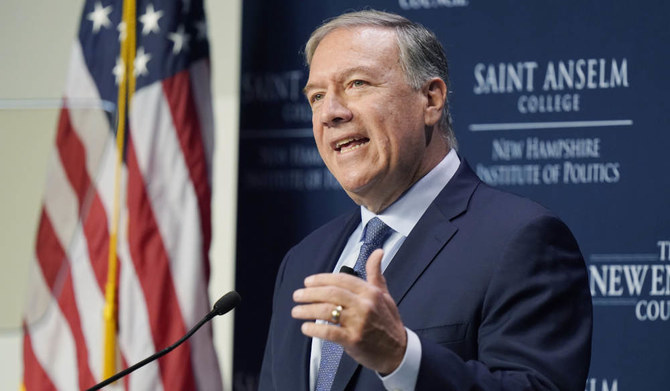WASHINGTON: The Biden administration has again extended government protection to former Secretary of State Mike Pompeo and one of his top Iran aides due to persistent threats against them from Iran.
In separate notices sent to Congress late last week, the State Department said the threats to Pompeo and Brian Hook remained “serious and credible.” Hook served as the Trump administration’s special envoy for Iran.
Along with Pompeo, Hook was the public face of the US “maximum pressure” campaign against Iran following President Donald Trump’s 2018 decision to withdraw from the Iran nuclear deal. Iran also blamed both men for the US assassination of Iran Revolutionary Guard commander Qassem Soleimani in Baghdad in January 2020 and vowed revenge.
The Jan. 5 notifications to Congress marked the 10th time the State Department has extended protection to Hook since he left office in January 2021 and the seventh time it has been extended to Pompeo. The discrepancy arises because Pompeo, as a former Cabinet secretary, automatically had government security for several months after leaving office.
The notifications, obtained by The Associated Press, were signed by Acting Deputy Secretary of State John Bass.
“I hereby determine that the specific threat with respect to former Secretary of State Michael Pompeo persists,” Bass wrote. He used identical language to refer to the threat against Hook.
The AP reported in March 2022 that the State Department was paying more than $2 million per month to provide 24-hour security to Pompeo and Hook. The latest determinations did not give a dollar amount for the protection.
Even as the Biden administration has made those determinations and spent money for Pompeo and Hook’s protection, it has continued to press ahead with indirect talks with Iran aimed at salvaging the 2015 Iran nuclear deal that Trump withdrew from in 2018.
Those talks have been stalled for many months now and the administration is pessimistic they will resume anytime soon. The administration has blamed Iran for the breakdown in talks, saying it has raised demands outside the scope of the deal, which gave Tehran billions in sanctions relief in return for curbs on its nuclear program.
In the meantime, Iran has launched a major crackdown on antigovernment protests sparked by the death of a woman in custody who was accused of violating a law requiring women to wear headscarves in public.
The notifications do not specifically identify Iran as the source of the threats, but Iranian officials have long vented anger at Pompeo and Hook for leading the Trump administration’s policy against Iran, including designating the Revolutionary Guard Corps a “foreign terrorist organization,” subjecting it to unprecedented sanctions and orchestrating the Soleimani assassination.


























